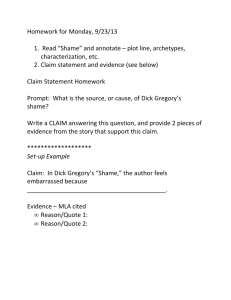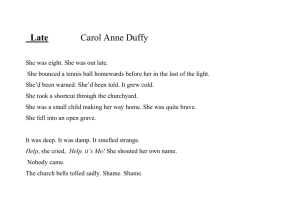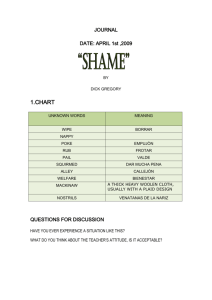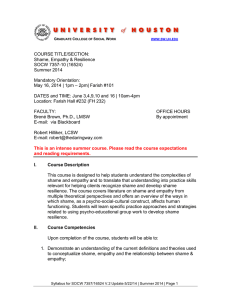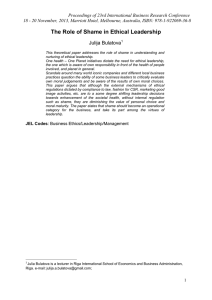COURSE TITLE/SECTION Shame, Empathy & Resilience SOCW 7357/16181
advertisement
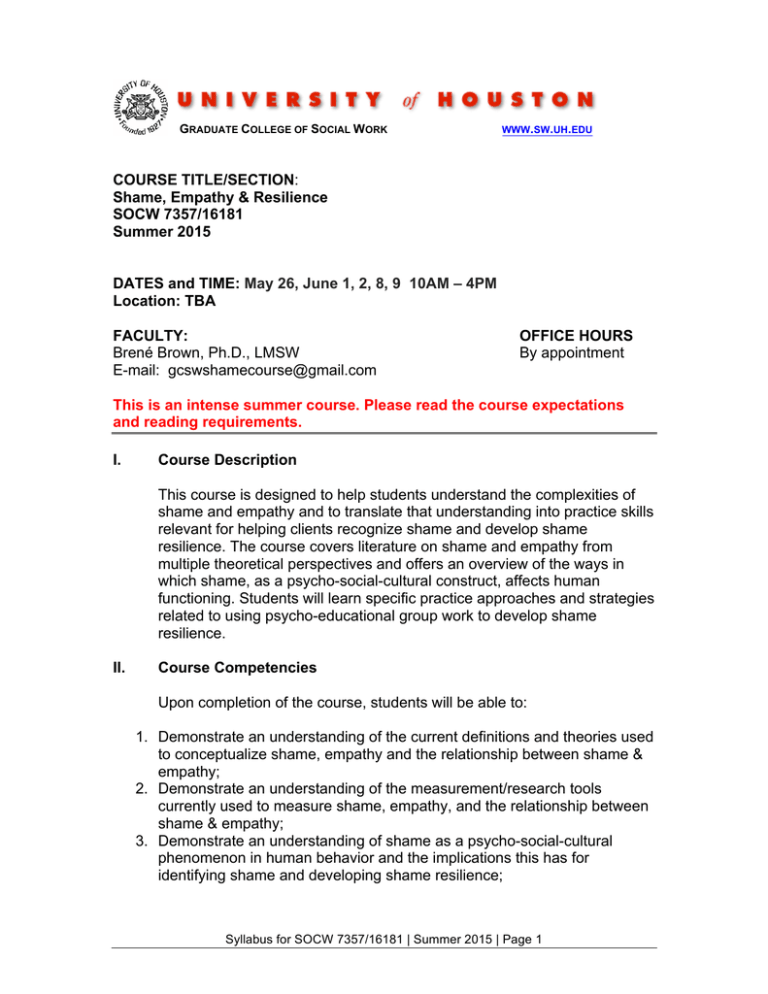
GRADUATE COLLEGE OF SOCIAL WORK WWW.SW.UH.EDU COURSE TITLE/SECTION: Shame, Empathy & Resilience SOCW 7357/16181 Summer 2015 DATES and TIME: May 26, June 1, 2, 8, 9 10AM – 4PM Location: TBA FACULTY: Brené Brown, Ph.D., LMSW E-mail: gcswshamecourse@gmail.com OFFICE HOURS By appointment This is an intense summer course. Please read the course expectations and reading requirements. I. Course Description This course is designed to help students understand the complexities of shame and empathy and to translate that understanding into practice skills relevant for helping clients recognize shame and develop shame resilience. The course covers literature on shame and empathy from multiple theoretical perspectives and offers an overview of the ways in which shame, as a psycho-social-cultural construct, affects human functioning. Students will learn specific practice approaches and strategies related to using psycho-educational group work to develop shame resilience. II. Course Competencies Upon completion of the course, students will be able to: 1. Demonstrate an understanding of the current definitions and theories used to conceptualize shame, empathy and the relationship between shame & empathy; 2. Demonstrate an understanding of the measurement/research tools currently used to measure shame, empathy, and the relationship between shame & empathy; 3. Demonstrate an understanding of shame as a psycho-social-cultural phenomenon in human behavior and the implications this has for identifying shame and developing shame resilience; Syllabus for SOCW 7357/16181 | Summer 2015 | Page 1 4. Apply concepts and theories from the current affect research on shame and empathy to intervention methods with micro, mezzo and macro client systems; 5. Demonstrate an understanding of the relationship between resilience, authenticity, belonging, and connection, and how these relationships inform our understanding of human interaction. 6. Demonstrate specific shame resilience practice skills in a psycho-educational setting, taking into consideration issues of client diversity. 7. Demonstrate an understanding of importance of self-awareness specifically pertaining to personal and professional shame issues in order to practice effectively and ethically with clients. III. Course Structure There will be five group quizzes administered during the course – one on each day that we meet. Each quiz is worth 15 points for a total of 75 points. A creative arts project is due on 6/9/15. You will receive instructions for this project on 5/26. This project is worth 25 points. You must attend class for the entire day for your quiz score to be recorded. If you miss more than 15 minutes of the class, a “0” will be recorded for your quiz grade. Quizzes begin at 10:10 AM. Grade #1 - Your first quiz is on 5/26/15. In order to successfully complete the quiz, you will need to read all of Daring Greatly (Brown, 2012) prior to the first day of class. Grade #2 – Your second quiz is on 6/1/15. This quiz will cover Chapters 1-6 in Shame and Guilt (Tangney & Dearing). Grade #3 – Your third quiz is on 6/2/15. This quiz will cover chapters 7, 10 and 11 in Shame and Guilt (Tangney and Dearing). Grade #4 – Your fourth quiz is on 6/8/15. In order to successfully complete the quiz, you will need to read all of the The Gifts of Imperfection (Brown, 2010). Grade #5 - Your final quiz is on 6/9/15. In order to successfully complete the quiz, you will need to read the Barbara Platek interview with Myriam Greenspan (see below for access information). IV. Textbooks The required texts for this course are: Syllabus for SOCW 7357/16181 | Summer 2015 | Page 2 Brown, B. (2012). Daring greatly: How the courage to be vulnerable transforms the way we live, love, parent, and lead. New York: Gotham. Brown, B. (2010). The Gifts of Imperfection. Minneapolis: Hazelden. Tangney, J. P., & Dearing, R. (2002). Shame and Guilt. New York: The Guilford Press These articles will be made available on Blackboard: Brown, B. (2006). Shame resilience theory: A grounded theory of women and shame. Families in Society. 87(01). Dearing, R., Stuewig, J., & Tangney, J. (2005). On the importance of distinguishing shame from guilt: Relations to problematic alcohol and drug use. Addictive Behaviors, 30, 1392-1404. Jordan, J. (1989). Relational development: Therapeutic implications of empathy and shame (Work in Progress No. 39). Wellesley, MA: The Stone Center Wellesley College. Jordan, J. (1992). Relational resilience (Work in Progress). Wellesley, MA: The Stone Center Wellesley College. Neff, K. D. (2003). Development and validation of a scale to measure selfcompassion. Self and Identity, 2, 223-250. Barbara Platek interview with Myriam Greenspan: Platek, B. (2008, January). Through a glass darkly: Miriam Greenspan on moving from grief to gratitude. The Sun, (385). Retrieved from http://thesunmagazine.org/issues/385/through_a_glass_darkly Wiseman, T. (1996). A concept analysis of empathy. Journal of Advanced Nursing, 23, 1162-1167. V. GRADING Grades will be assigned as follows: A = A- = B+= B = B- = 96-100% 92-95.9% 88-91.9% 84-87.9% 80-83.9% C+ = 76-79.9% C = 72-75.9% C- = 68-71.9% D = 64-67.9% F = Below 64% Syllabus for SOCW 7357/16181 | Summer 2015 | Page 3 VI. Governing Policies Please refer to the GSSW Student Handbook for all policies that guide student activity in the GSSW. In particular, please note the following: 1. Students must adhere to University of Houston (UH) regulations regarding academic honesty. Academic dishonesty may be grounds for dismissal from UH, disciplinary action and/or course failure. For more information on the Academic Honesty Policy, please see www.uh.edu/academics/catalog/general/acade.html. It is important that all students understand that plagiarism occurs any time a writer fails to credit an author for his or her exact words or ideas. Each sentence that uses the word, words and/or ideas of others must be cited. 2. In the social work profession, professional accountability is measured by respect for others, the belief that all people deserve to be treated with dignity and a commitment to confidentiality. To borrow from Dr. Jean Latting's syllabus, "The guiding philosophy is that we may share widely the learning from the class, but treat with care, respect and confidentiality what others share with us." 3. Whenever possible, and in accordance with 504/ADA guidelines, the University of Houston faculty will attempt to provide reasonable academic accommodations to students who request and require them. Please call 713-743-5400 for more assistance. VII. Consultation Once the course has started, please contact me via Blackboard email if you need any additional information or if you have any questions about the course. Addendum: Whenever possible, and in accordance with 504/ADA guidelines, the University of Houston faculty will attempt to provide reasonable academic accommodations to students who request and require them. Please call 713.743.5400 for more assistance. Syllabus for SOCW 7357/16181 | Summer 2015 | Page 4
